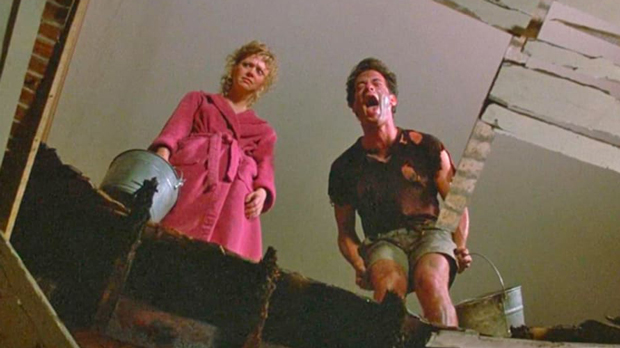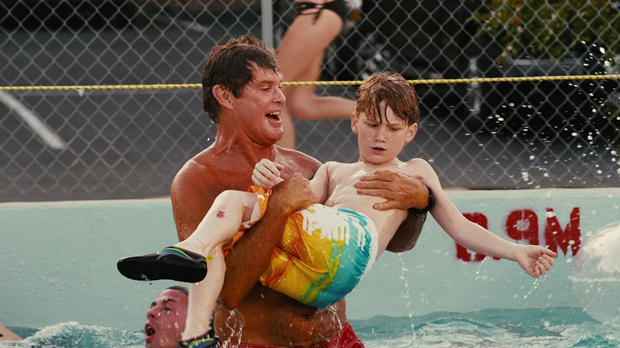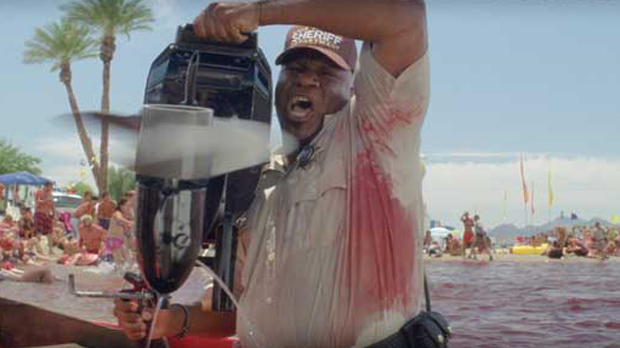 The Money Pit (1986) Universal/Comedy RT: 91 minutes Rated PG (language, slapstick violence, suggestive material) Director: Richard Benjamin Screenplay: David Giler Music: Michael Colombier Cinematography: Gordon Willis Release date: March 26, 1986 (US) Cast: Tom Hanks, Shelley Long, Alexander Godunov, Maureen Stapleton, Joe Mantegna, Philip Bosco, Josh Mostel, Yakov Smirnoff, Carmine Caridi, Brian Backer, Billy Lombardo, Mia Dillon, John van Dreelen, Douglass Watson, Tetchie Agbayani, Mary Louise Wilson, Irving Metzman, Henry Baker, Mike Starr, Frankie Faison, Jake Steinfeld, Nestor Serrano, Michael Jeter, Afemo Omilami, Bruno Iannone, Wendell Pierce. Box Office: $37.4M (US)/$54.9M (World)
The Money Pit (1986) Universal/Comedy RT: 91 minutes Rated PG (language, slapstick violence, suggestive material) Director: Richard Benjamin Screenplay: David Giler Music: Michael Colombier Cinematography: Gordon Willis Release date: March 26, 1986 (US) Cast: Tom Hanks, Shelley Long, Alexander Godunov, Maureen Stapleton, Joe Mantegna, Philip Bosco, Josh Mostel, Yakov Smirnoff, Carmine Caridi, Brian Backer, Billy Lombardo, Mia Dillon, John van Dreelen, Douglass Watson, Tetchie Agbayani, Mary Louise Wilson, Irving Metzman, Henry Baker, Mike Starr, Frankie Faison, Jake Steinfeld, Nestor Serrano, Michael Jeter, Afemo Omilami, Bruno Iannone, Wendell Pierce. Box Office: $37.4M (US)/$54.9M (World)
Rating: ** ½
Ostensibly a remake of Mr. Blandings Builds His Dream House with Cary Grant and Myrna Loy, The Money Pit stars Tom Hanks and Shelley Long as a couple who buy a house for a song only to discover it’s literally falling apart. Directed by Richard Benjamin (My Favorite Year), it’s a funny movie that could have been better had it bothered to make something of the supporting characters, most of whom just drop by for a quick visit before moving on and out. Why bother introducing characters you don’t plan to use later?
Attorney Walter Fielding (Hanks, Splash) is already in a deep financial hole when we first meet him. His father embezzled millions of dollars from their clients and fled the country leaving Walter Jr. to pay it all back. As if that wasn’t enough, he and his classical violinist girlfriend Anna (Long, Cheers), who have been subletting her ex-husband Max’s (Godunov, Die Hard) luxury apartment, have to find a new place now that he’s returned a week early from his extended trip to Europe.
Walter’s unscrupulous real estate agent friend (Mostel, Billy Madison) finds them a huge house that’s going for only a fraction of its worth. The owner (Stapleton, Reds) needs to sell in a hurry due to legal issues involving her husband. In order to sweeten the deal, she throws in the furniture and her antique car. Believing they’ve stumbled across the deal of a lifetime, Walter and Anna buy it. It isn’t long before buyer’s remorse sets in. Boy, does it ever!
Disaster waits in every nook and cranny staring with the stairway literally collapsing under Walter’s feet. Everything goes haywire; the electricity, plumbing, gas, interior and exterior. This means putting up thousands more dollars for plumbers, contractors and permits. The crew promises the couple it’ll take no more than two weeks to complete the work, but anyone who’s ever dealt with contractors knows that’s a big joke. As weeks become months, Walter and Ana’s relationship begins to suffer.
While I laughed frequently, I won’t sit here and claim The Money Pit is a comedy classic. It’s not. I certainly didn’t think so when I saw it at the movies with a friend on Good Friday ’86 (March 28). I still don’t. It is, however, better than most people give it credit for. The humor is mostly slapstick and sight gags. It has a few well-orchestrated comic set-pieces, but the topper has to be this sustained Rube Goldberg set-up in which a chain of disastrous events unfolds with meticulous precision. It starts with Hanks stepping where a plank used to be (up until a few seconds before) and goes on from there. Other amusing bits include a kitchen from Hell, a bathtub falling through the floor, a raccoon attack and a cooked turkey flying through the bathroom window. We know it’s cooked because the little doohickey pops up.
The main problem with The Money Pit is how the screenplay short-changes interesting supporting characters by limiting their screen time. Take the contractor played by Joe Mantegna (Three Amigos), a slick lothario with perfect hair who starts hitting on Anna the second he crosses the threshold. Instead of sending him packing, Walter hires him because it was a hassle to even get him out there in the first place. He eagerly accepts Walter’s check though. There’s great comic potential here, but we never see him again. The same goes for Benny (Lombardo), a spoiled child star who needs a good swift kick in the derriere. He’s Walter’s top client and the one he goes to for a loan to buy the house. Their interaction culminates with Walter threatening not to like Benny anymore if he doesn’t lend him the money. He too disappears after one solid scene. Don’t even get me started on Cheap Girls, a rock group comprised of men in drag. I won’t even tell you what (or should I say who) they want to change the band’s name to. We don’t see enough of these guys either.
Hanks and Long exhibit okay chemistry as the couple not yet married because Anna’s afraid to take the plunge again. Their story is a weak link, but it hurts less because they’re both gifted comic actors. Hanks, while not in top form, has a handful of good moments like when he falls through the floor and gets pinned halfway down by the rug. He can’t move; he can barely breathe. He’s there for a long time. Long’s character is annoyingly clueless at times, but her reactions in other scenes are priceless. Godunov shows his funny side here as an egotistical symphony conductor (the very one his ex-wife is in) willing to try anything to get back together with his ex.
As a director, Benjamin achieved comic perfection with My Favorite Year, still a riot four decades later. Peter O’Toole delivers one of the best comic performances of all time. The Money Pit doesn’t come close. It has its moments, but the overall effect is less than it should be. But even with its shortcomings, like its tendency to be heavy-handed at times, it’s still entertaining. I’m sure it has nothing on Mr. Blandings though.




